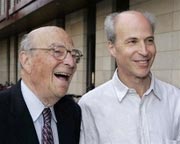Cell research works won the Nobel Prize in Chemistry
Almost half a century after his father won the Nobel Prize, American professor Roger D. Kornberg also won this year's Nobel Prize in Chemistry for his study of how cells get information from genes to make proteins.

Roger D. Kornberg (right) and his father.(Photo: AP)
His work produced a detailed picture of this process, called the reading process, the Swedish Royal Academy of Sciences said. Disturbances in this reading process occur in many human diseases, including cancer, heart disease and many other types of infections. Kornberg's discovery helped lay the foundation for the development of many drugs against these diseases.
Speaking at the press conference, Kornberg also said: "There will be specific treatments for some diseases in the next decade."
The reading process helps genes recognize proteins that cells produce. In this process, information from the gene will be used to create molecules called " RNA messengers ". These molecules will transfer information to a protein-making machine in cells. In contrast, protein also acts as a cell structure that helps cells operate effectively.
"Thanks to his ingenuity, Kornberg was able to freeze in the midst of building the ARN, so he could record the whole process of reading it and create a real revolution." award speech.
The 59-year-old scientist is a member of Stanford University Medical School in Palo Alto, California. His father, Arthur Kornberg, also won the Nobel Prize in Medicine in 1959 for his work on genetics.
Roger D. Kornberg is the only person who won the chemistry prize and is the fifth American to win the Nobel Prize this year. Last year's Nobel Prize for Chemistry went to Yves Chauvin of France and Robert H. Grubbs and Richard R. Schrock of the United States, thanks to discovering ways to reduce toxic waste when creating new chemicals.
MT
- Research on lithium-ion batteries won the 2019 Nobel Prize in Chemistry
- Research to create new drugs won the Nobel Prize in Chemistry 2018
- Three scientists shared the Nobel Prize in Chemistry
- Useful discoveries about DNA winning the 2015 Nobel Prize in Chemistry
- Master of Nobel Prize for Chemistry 2009
- Frizt Haber - Murderer receives the Nobel Prize in Chemistry
- The Nobel Prize in Chemistry belongs to two Americans
- Research on the image of Ig Nobel prize winner 2018
- Sweden solemnly organized the 2015 Nobel Prize Ceremony in Stockholm
- The 2017 Nobel Prize for Chemistry helps
- Nobel prizes were 'mistakenly given' in history
- The 2012 Nobel Prize for Literature is about to have an owner
 Daily use inventions come from universities
Daily use inventions come from universities Special weight loss device helps prevent appetite
Special weight loss device helps prevent appetite 8 inventors were killed by their own inventions
8 inventors were killed by their own inventions Iran invented a motor car powered by water
Iran invented a motor car powered by water Add new elements to the periodic table
Add new elements to the periodic table  Ralph Bear - the father of video games
Ralph Bear - the father of video games  House for emergency rescue
House for emergency rescue  Professor John Pendry's stealth machine
Professor John Pendry's stealth machine  Kiet engineers and CNC machines
Kiet engineers and CNC machines  Fingerprint - biological identity
Fingerprint - biological identity 